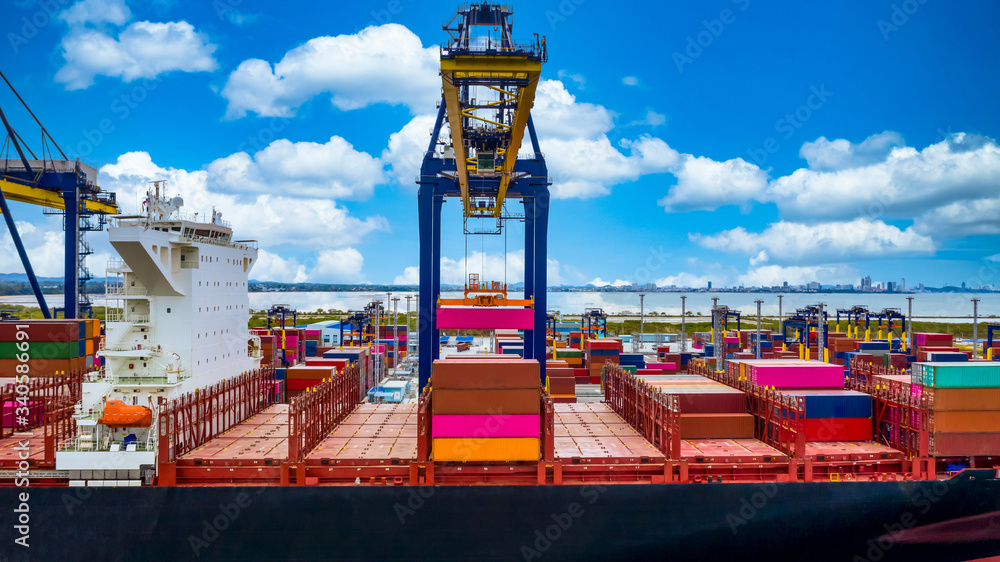
Overview of Quay Cranes
Quay Cranes (QC), pivotal in container and terminal operations, represent a cornerstone of modern material handling logistics, particularly in maritime environments. Gantry cranes are used for loading with high efficiency and safety, facilitating the rapid loading and unloading of containers from vessels. Leveraging advanced quay crane technology, they also provide automation that improves throughput and reliability. When the gantry container cranes move containers, they are lowered onto trucks or trolleys, where they are secured by locks on the floor of the vehicle. The usage of QCs has become a global standard for intermodal transport operations, ensuring seamless container and cargo transitions around ports and across the road, ship, and distribution networks in the real world. These cranes can be fitted with various accessories to optimize different types of handling operations. The cranes container terminals use often include portable rubber tires and hydraulic systems for efficient movement. All rights reserved.
Key Technologies and Innovations
The evolution of QC technology has introduced automation in container and crane handling. Automated quay cranes are equipped with spreader locks, and advanced gantry container cranes are directly linked to systems, reducing manual intervention and improving safety. These systems also provide real-time data for monitoring the length of container movement and handling processes. Automation allows for more efficient unloading, optimized yard container placement, and better container and terminal management. The container handling process has seen significant improvements in both speed and safety metrics, especially in large terminals. STS cranes container operations are reliable, with components that enable high performance. Cranes ship shore models incorporate special knuckle boom and beam structures, allowing them to handle heavy cargo with ease. Some ship shore cranes are even equipped with electric motors to reduce emissions. Here, you can find the latest crane models that have streamlined port operations at competitive prices, offered by reputable supplier companies. These features have made quay cranes essential to modern offshore logistics.
Operational Benefits of QC
Implementing advanced quay crane systems offers significant operational advantages. High-speed container handling services enhance port operations and throughput. These cranes have been sized to handle both TEU and FEU containers, making them versatile for different types of container sizes. The technology behind crane operations helps companies improve their processes, providing a substantial return on investment through lower operational costs and enhanced capacity utilization. Handling container operations at terminals benefit from wide-ranging innovations, reducing downtime and improving cranes container handling efficiency. Also, the components offer reliable performance with heavy lifting capacity. Handling the wheel of sea cranes ship shore traffic at a manufacturing or container terminal involves using different systems like chain hoists and cable mechanisms for maximum efficiency. Crane board systems integrate with terminal logistics for smooth operations, especially during peak periods in construction and marine environments. The connection between quay crane technology and the broader industry has driven consistent improvements in port logistics.
Challenges in QC Deployment
Despite the benefits of QC deployment, there are challenges in business adoption. First, the initial costs for automation and technology are high. Second, it requires skilled developers and personnel to operate these systems. However, there is support available for training and policy development that can help companies transition more smoothly. Advanced Remote systems are available for training, and the last improvements in crane design have addressed many operational concerns. Conditions for deployment include skilled labor, requirements for automation, and specific engineering solutions tailored for cranes ship shore operations. The crane systems require regular assessment and maintenance to ensure continuous high performance. Additionally, components such as slings and spreaders need to be carefully monitored. Installation and maintenance must be handled properly for sustained performance, and regular references from sales reports or track records from other customer experiences should be sought out for ongoing optimization and improvement. Which system works best is often determined by the specific needs of the location and port terminal. Fully automated systems are becoming more popular as they reduce the need for manual labor, and parts of the machinery can be quickly fixed if malfunctions occur.
| Feature | Traditional Crane Operations | Advanced Quay Crane Operations |
|---|---|---|
| Technology | Manual control, minimal automation | Highly automated, anti-sway technology |
| Operational Efficiency | Lower, due to manual handling | Higher, due to automation and precision |
| Safety | Higher risk of accidents | Enhanced safety protocols and reduced human error |
| Productivity Metrics | Moderate throughput | High-speed container handling, increased throughput |
| Operational Challenges | Requires more manual labor | Initial cost and training for automation technology |
| Energy Efficiency | Less energy-efficient | Energy-efficient operations with advanced systems |
| Maintenance | Regular maintenance required | Advanced monitoring for predictive maintenance |
| Capacity Utilization | Limited by manual operation speeds | Optimized through streamlined handling processes |
Contents:
- Find information about container handling systems
- Learn about automated container terminals
- Search the glossary for more terms like FEU and TEU
Solutions
ContPark provides solutions for advanced container terminal operations, integrating automation, cranes, and systems that can improve the way terminals operate.
Contact us for details on improving your port’s efficiency with cutting-edge quay crane technology.
